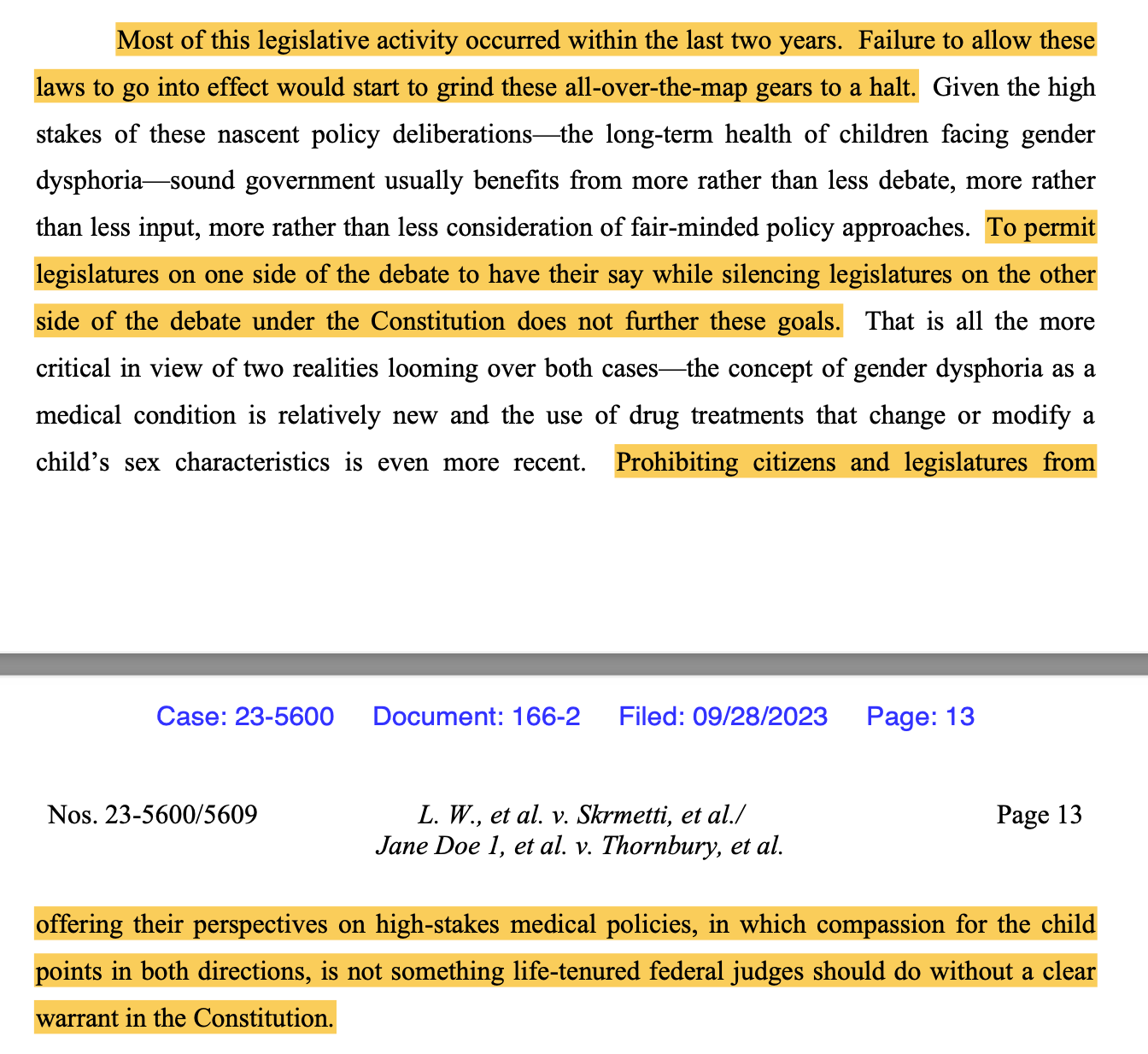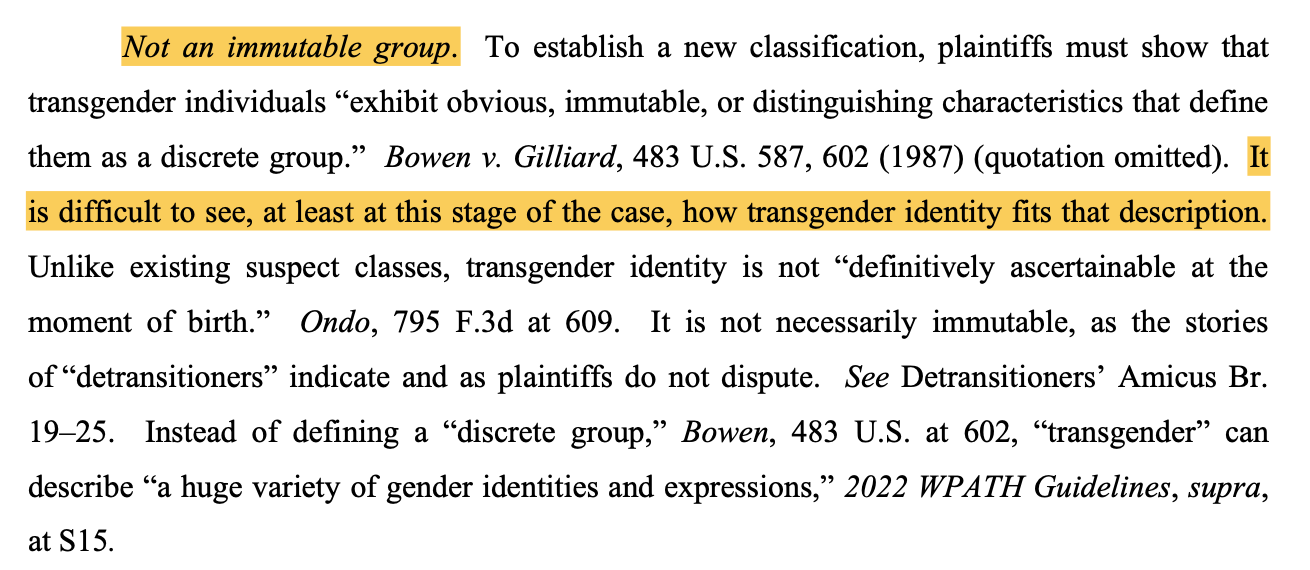Judge Jeff Sutton ignores anti-trans reality to uphold Tennessee, Kentucky trans care bans
Sutton's ruling is an act of judicial cowardice that masks itself as one of judicial humility.
On Thursday night, the U.S. Court of Appeals for the Sixth Circuit, on a 2-1 vote, upheld bans on gender-affirming medical care for minors in Tennessee and Kentucky as likely constitutional, reversing decisions of district courts enjoining enforcement of both laws.
The laws in both states have been enforceable since July, the result of a similar ruling from the same panel temporarily halting the injunctions, but Thursday’s ruling followed fuller briefing and oral arguments held earlier this month. Further appeals, either for en banc review from the full Sixth Circuit or the U.S. Supreme Court, are likely.
Thursday’s opinion from Chief Judge Jeffrey Sutton, joined by Judge Amul Thapar, ignored the obvious anti-transgender atmosphere that has permeated legislative sessions across the United States — leading to passage of anti-trans laws in more than 20 states this year — by presenting the current moment as a “both sides are legislating on this issue so us judges should let them” scenario.
Judges at trial courts, reviewing the evidence, see the reality. They are unanimous — regardless of the president who appointed them — in ruling that these bans are unconstitutional or likely unconstitutional, depending on the procedural posture of the case. As Judge Helene White wrote in her dissent to Sutton and Thapar on Thursday, “In each lawsuit, the district court made robust factual findings based on an extensive record, and neither court found that banning these treatments is beneficial to minors, nor has any district court confronting similar laws outside this circuit.”
Sutton chose to ignore reality — and the district courts’ findings — in an act of judicial cowardice that masks itself as one of judicial humility.
Describing “nascent policy deliberations” and setting up the discussion as one of “both sides,” Sutton is able to create his idyllic world of lawmakers carefully considering a new topic, reaching differing, yet reasoned, judgments.
That is not what has happened.
Anti-transgender sentiments have increased as anti-transgender groups have pushed them, leading lawmakers to their own actions against topics that are not new in their own acts of political cowardice. Sutton and Thapar on Thursday joined them down that path.
To the extent other states are legislating in a “pro-trans” manner — which Sutton uses to claim this “all-over-the-map” legislating — the states are largely responding, seeking to protect a class of people that is being targeted by the other states whose laws are being challenged. They would not have legislated had the status quo — trans people being able to obtain health care without state-mandated restrictions — continued. This is plain to anyone who has followed the news, let alone the legislatures, over recent years.
But, from Sutton, what we got on Thursday night was a pair of arguments that lead to the inescapable conclusion that reality does not matter to him.
First, he claimed that it is “difficult to see” how transgender people constitute a “discrete group” defined by “obvious, immutable, or distinguishing characteristics.”
Then, he claimed that laws banning medically necessary health care for transgender teens are not based on animus because “a law premised only on animus toward the transgender community would not be limited to those 17 and under.”
This is not a judicial opinion that demands, or even asks, to be taken seriously.
States are passing laws defining “sex” to prevent trans people from legally being able to identify as their sex in those states, banning birth certificate changes for transgender people, banning transgender women from participating in women’s sports in schools, prohibiting children from exploring their gender identity without fear of forced disclosure to their parents, banning discussion of LGBTQ-related topics in schools, barring transgender students from using the restroom that accords with their gender identity, and banning gender-affirming medical care for minors.
Lawmakers have made it perfectly, repeatedly apparent that they can define and target this “discrete group” in their laws. And the weeks and weeks of legislative hearings and debates across the country provide volumes of evidence — accepted by trial court judges across the ideological spectrum in cases brought across the country — that “plainly” illustrate the purpose behind these laws.
None of it suggests that we are living in a time in which “the States are engaged in thoughtful debates,” as Sutton wrote.
To the contrary, it is clear that transgender people are under attack.
That many lawmakers started with a ban of minors’ treatment in this one particular area of legislating is no respite, as a matter of fact or law. Notably, Sutton ignored the fact that the U.S. Court of Appeals for the Eleventh Circuit opinion that he cited favorably upheld an Alabama law that covers 18 year olds. What’s more, that Eleventh Circuit ruling already has had spillover effect, leading a federal judge in Florida to refuse to halt enforcement of a law in that state that severely limits gender-affirming medical care for adults.
In this environment, the decision of a state to use its greater authority over regulation of minors to achieve impermissible results does not lead a careful jurist to the conclusory statement that “[t]he legislature plainly had other legitimate concerns in mind.”
But, that is what we got from Sutton, with Thapar’s backing, on Thursday night.
There is much more to critique about Sutton’s ruling. Its treatment of the three underlying legal claims — sex discrimination, discrimination based on transgender status, and violation of parental rights — are exercises in judicial avoidance. They merit time and attention, as does White’s thoughtful dissent — and I hope to return to them — but the issues are not new. They are the same three primary issues raised in challenges to most of these laws, so I have discussed the issues in the past.
Sutton’s claim of judicial humility in ruling that “accountable elected officials” must be allowed to “sort[] out these medical, social, and policy challenges,” however, is a lie that must be addressed quickly and exposed.
As White wrote, “[W]hen a fundamental right or freedom from discrimination is involved, experimentation [in state laws] has no place.”
A refusal to acknowledge, let alone address, an organized campaign against the ability of transgender people to live their lives freely and fully is not judicial humility.
It is judicial failure.








What Sutton and other judges don't take into consideration, is that hormonal and surgical treatments for sexual dysphoria have been in place for years, for teens as well as adults, and NO state or local government had taken upon itself to legislate bans against these medically sanctioned and approved treatments. Only the past 2-3 years have we seen Red state legislators work themselves up into a fury over not only medically supervised transgender rectification, but also a hysterical animadversion directed toward the transgender themselves, with memes such as "the transgender agenda" - whatever the hell THAT means - demeaning them and even criminalizing their families and their medical teams with their shitty, cruel laws.
Settled medical judgments and treatments don't NEED "sorting out" by "accountable public officials"...I mean, we're not talking about Nazi "eugenics" or Mengele concentration-camp experiments, for god's sake...what is wrong with these judges who endorse state intervention into private medical decisions?? That's the crime, full stop.
Medical decisions should be between the patient & their physician. Legislators & judges are not qualified to decide these matters, & they should not make ignorant laws that interfere with the necessary health care of all people.